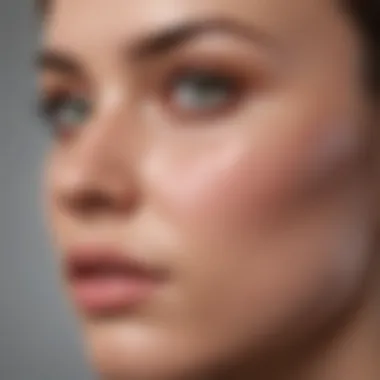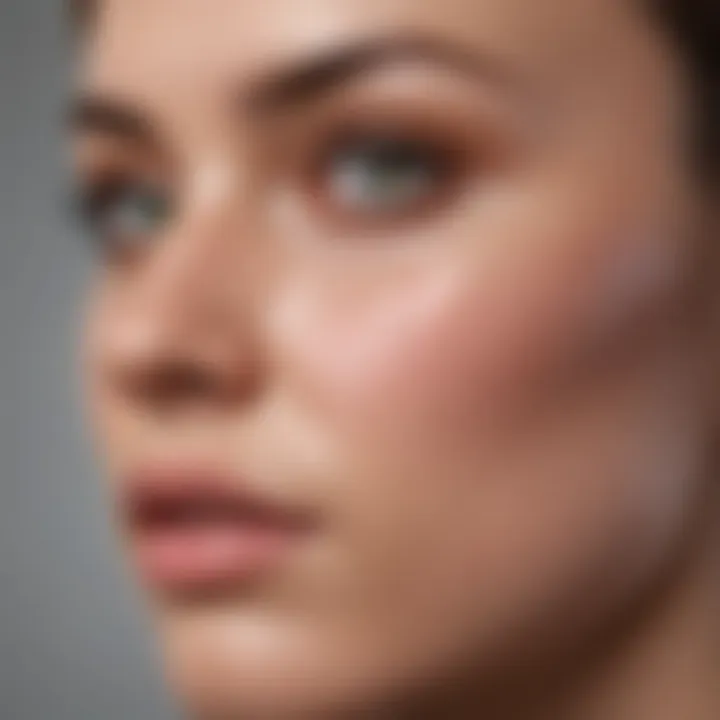Effective Strategies to Combat Birth Control Acne


Intro
The relationship between hormonal birth control and acne is complex and often misunderstood. Many individuals who use hormonal contraceptives report experiencing acne flare-ups, which can be distressing and affect self-esteem. It is crucial to understand the physiological mechanisms behind this phenomenon as well as the effective strategies to prevent or treat these unwanted skin issues. By exploring this topic, individuals can navigate their skincare options better while on birth control.
Insider Beauty Tips
Beauty Hacks
Hormonal changes are a well-known trigger for acne. To manage breakouts effectively, one can consider these beauty hacks:
- Use non-comedogenic products: Ensure your skincare and makeup products do not clog pores. Look for labels that specify 'non-comedogenic'.
- Minimal makeup: When battling acne, less can indeed be more. Allow your skin to breathe. Use a light foundation or tinted moisturizer instead of heavy layering.
Skincare Tips
The influence of hormonal birth control on the skin necessitates an adaptable skincare routine. Here are some tips to keep in mind:
- Consistent cleansing: Clean your face daily to remove excess oil and impurities. Opt for a gentle cleanser to avoid irritating sensitive skin.
- Moisturize properly: Even if your skin is oily, a light moisturizer is essential. Hyaluronic acid-infused products can hydrate without suffocating the skin.
Haircare Secrets
Hormonal fluctuations often impact hair health as well. To mitigate associated concerns:
- Gentle hair products: Use sulfate-free shampoos and conditioners to keep your scalp healthy.
- Avoid heat styling: Reducing the frequency of heat exposure can help maintain hair integrity during hormonal changes.
Product Reviews
Skincare Products
Selecting the right products is vital in combatting birth control acne. Consider the efficacy of the following:
- Benzoyl Peroxide: Effective against acne, this classic treatment reduces bacteria and helps unclog pores.
- Salicylic Acid: Promotes exfoliation and helps in preventing new breakouts.
Makeup Products
To ensure your makeup works with your skin, look for:
- Oil-free foundations: They prevent exacerbating oily skin concerns.
- Lightweight concealers: These can provide coverage without causing breakouts.
Haircare Products
Investing in the right hair products can make a difference too:
- Leave-in conditioners: Moisturize hair without weighing it down, a valuable attribute during hormonal fluctuations.
Makeup Trends
Latest Makeup Trends
Staying in line with current trends can inspire fresh looks that don’t irritate the skin. Trending elements include:
- Natural finishes: A move towards dewy looks with minimal heavy products promotes skin health.
- Skin-like textures: Products that mimic skin texture can help achieve a balanced look without overdoing it.
Seasonal Makeup Looks
Adapting your makeup routine to fit seasonal changes can keep your skin healthy:
- Summer: Stick to light and breathable products.
- Winter: Added hydration layers can be necessary.
Celebrity Beauty Inspiration
Observing celebrity routines, like those of Emma Watson or Rihanna, can provide practical examples of adapting beauty regimens effectively.
Beauty Industry News
New Product Launches
Staying informed about new skincare launches can offer modern solutions for managing birth control acne:
- Keep an eye on brands like The Ordinary and Cosrx who continuously update their ranges with innovative products targeting acne.
Brand Collaborations
Collaborations often yield unique products that might benefit those dealing with skin issues:


- Follow updates from brands such as Fenty Beauty and Glossier for their newest offerings.
Beauty Events Coverage
Participation in events can reveal useful firsthand knowledge about products:
- Look for webinars or expos that focus on skincare and beauty, where professionals share insights.
Understanding how hormonal birth control interacts with skin is key to finding effective solutions for acne. With informed strategies, one can navigate skincare effectively while managing hormonal changes.
Understanding Birth Control and Acne
The relationship between birth control and acne is significant and complicated. Many individuals who choose hormonal contraceptives may not realize the potential for skin breakouts as a side effect. Understanding how birth control influences acne can aid readers in making informed decisions about their skincare routine. This section provides a foundational overview of the physiological changes that occur with hormonal methods and their impacts on skin health. It is crucial to recognize that while birth control can help regulate hormones, it can also lead to skin flare-ups in some users. This article will navigate through different aspects of this phenomenon, offering insights that may help mitigate unwanted acne.
The Mechanism of Hormonal Changes
Hormonal birth control methods primarily alter the levels of estrogen and progesterone in the body. When these hormones fluctuates, they can indirectly influence the production of sebum, the skin's natural oil. Increased sebum production can lead to clogged pores, which are a primary cause of acne.
- Estrogen's Role: Estrogen is known to help reduce oil production. Thus, higher levels of estrogen in combined oral contraceptives can sometimes reduce acne. However, not all birth control methods provide the same ratio of hormones, which can result in different effects on skin health.
- Progesterone's Influence: Progesterone can cause an increase in sebum production. Some formulations of birth control pills, particularly those that use progestin, can trigger acne, especially if the body is sensitive to changes in hormone levels.
- Inflammation Response: Hormonal fluctuations can also ignite an inflammatory response that worsens acne. This inflammation is exacerbated by increased oil production and blocked pores, creating an ideal environment for bacteria to thrive.
Understanding these mechanisms is essential for individuals who experience birth control acne, as it emphasizes the importance of selecting the right type of contraceptive method.
Historical Context of Acne Treating with Birth Control
Historically, birth control pills have been prescribed not just for contraception but also as a treatment for acne. This dual purpose emerged in the 1960s when doctors recognized the potential benefits of hormonal regulation in treating skin conditions.
- Introduction of the Pill: The advent of the oral contraceptive pill led to a surge in prescribing hormones to manage various medical concerns, including acne.
- Regulatory and Clinical Studies: The recognition of birth control’s potential as an acne treatment prompted clinical studies. Treatments like Ortho Tri-Cyclen were tested and approved to specifically address acne resulting from hormonal imbalances.
- Changing Perspectives: Over time, there has been an evolving understanding of how hormonal treatments can vary in effectiveness for different individuals. As the landscape of dermatology and gynecology has changed, it is essential to view hormonal treatments with a discerning eye, advocating for personalized healthcare approaches.
Ultimately, recognizing the historical evolution of using birth control for acne treatment highlights how informed choices can lead to better skin health outcomes.
Types of Birth Control and Their Effects
Understanding the different types of birth control and their effects is essential for anyone looking to manage acne related to hormonal changes. Various methods employ hormones in ways that can either exacerbate or mitigate acne. Each form of contraception interacts with the body differently, and knowing these distinctions is critical for effective acne management.
Combined Oral Contraceptives
Combined oral contraceptives, often referred to as "the pill," contain both estrogen and progestin. This combination can be beneficial for acne treatment. Estrogen works to decrease androgen levels in the body. Androgens are hormones that can lead to increased oil production in the skin, which often causes breakouts.
Studies show that women using combined oral contraceptives may experience a reduction in acne lesions. However, it is crucial to consult a healthcare professional before starting. Not all pills are created equal; some are more effective for acne than others.
Progestin-Only Pills
Progestin-only pills, also known as the mini-pill, primarily contain progestin without estrogen. These can be a good option for women who cannot take estrogen for health reasons. However, the impact on acne can vary. Some users report improvement, while others may experience worsened breakouts.
The lack of estrogen means there is less control over androgen levels, which can contribute to acne. Understanding individual body responses is vital, so monitoring skin changes when starting this type of birth control is necessary.
Hormonal IUDs
Hormonal intrauterine devices (IUDs) release progestin directly into the uterus. This localized hormone can reduce menstrual pain and regulate cycles. Some studies suggest that these IUDs can have a positive effect on acne. They tend to lead to fewer hormonal side effects than systemic contraceptives.
While the direct relationship between hormonal IUDs and acne isn't completely clear, reduction in menstrual irregularities can lead to a decrease in hormonal fluctuations. Many users report improved skin conditions after beginning this form of birth control.
Hormonal Implants
Hormonal implants, such as Nexplanon, are another form of birth control that release progestin. They are effective for up to three years and are designed for ease of use. Like hormonal IUDs, implants work by releasing hormones that help regulate the menstrual cycle.
The effect on acne may vary significantly among users. Some find their skin becomes clearer, while others experience breakouts. The variability can be attributed to individual hormonal responses. Therefore, keeping in close contact with a healthcare provider to track any changes in skin condition is recommended.
Recognizing Acne Caused by Birth Control
Understanding how to recognize acne triggered by hormonal birth control is essential for effective management. Identifying the specific causes allows individuals to tailor their treatment strategies accordingly. Birth control can influence skin in various ways, leading to breakouts that may look different from usual acne. Therefore, having a clear grasp on how to identify and diagnose this type of acne is the first step towards treatment.
Identifying Symptoms
When trying to determine if acne is caused by birth control, one must take note of symptom patterns. Common features that characterize birth control-related acne include the following:
- Location: Typically, this type of acne can appear on the lower face, particularly the jawline and chin. This distribution is due to the hormonal influence on sebaceous glands.
- Timing of Flare-Ups: Breakouts often coincide with the initiation of a new hormonal contraceptive or changes to dosage. If acne appears shortly after starting birth control, it may well be the cause.
- Acne Type: Hormonal acne tends to manifest as cystic bumps rather than typical pimples. Cysts often feel deeper and are more painful.
Recognizing these signs can greatly assist in understanding whether birth control is at fault.
Distinguishing from Other Acne Types
To effectively combat acne associated with birth control, it’s important to distinguish it from other acne types such as:
- Acne Vulgaris: This is the most common form, usually characterized by blackheads, whiteheads, and pustules found on the forehead, nose, and cheeks. It often results from clogged pores rather than hormonal changes.
- Hormonal Flare-Ups: Hormonal fluctuations unrelated to birth control, such as those seen with menstruation or hormonal disorders, can also cause acne. Observing flare-up timelines is key here.
- Stress-Induced Acne: This type tends to appear randomly and can be found all over the face due to stress factors but generally does not follow a specific hormonal pattern.


Differentiating these types requires careful observation and possibly a skin-care diary to track product use, medication changes, and acne patterns.
Important Note: If there’s uncertainty or if symptoms escalate, consulting a dermatologist can provide clarity and personalized advice specific to one’s skin type.
Prevention Strategies for Birth Control Acne
The prevention of acne related to hormonal birth control is a crucial aspect of maintaining skin health for those using these contraceptives. Understanding the potential for acne flare-ups associated with hormonal changes allows individuals to take proactive measures. Prevention strategies can significantly reduce the frequency and severity of these breakouts, ensuring that the process of managing birth control remains as straightforward as possible. By implementing a tailored skincare regimen and choosing the right products, one can minimize the adverse effects that may arise.
Skin Care Routine Recommendations
An effective skincare routine can serve as the first line of defense against birth control-related acne. It should include the following key steps:
- Gentle Cleansing: Use a mild, non-irritating cleanser twice a day. This helps to remove excess oil and impurities without stripping the skin of its natural moisture.
- Exfoliation: Incorporate gentle exfoliants, like chemical exfoliants with salicylic acid or glycolic acid, a few times a week. This aids in removing dead skin cells and prevents clogged pores, which are common culprits in acne formation.
- Moisturizing: Even oily skin needs hydration. A lightweight, oil-free moisturizer is essential to maintain the skin's balance. Look for products that contain hyaluronic acid, which hydrates without adding excess oil.
- Sun Protection: Applying a broad-spectrum sunscreen daily is vital, as some acne treatments can make the skin more susceptible to sun damage. Opt for a sunscreen that is labeled as non-comedogenic to ensure it does not contribute to breakouts.
- Night Care: At night, consider using a retinol-based product if your skin can tolerate it. Retinol promotes cell turnover and can help clear clogged pores, a common problem with hormonal acne.
It is beneficial to regularly reassess your skincare routine. This allows for adjustments based on the state of your skin and any changes in your hormonal contraceptive method.
Importance of Non-Comedogenic Products
Choosing non-comedogenic products is pivotal for anyone dealing with acne, especially for those on hormonal birth control. Non-comedogenic products are formulated to not block pores, thus minimizing the risk of further breakouts. Here are several benefits of integrating non-comedogenic items into your skincare and makeup routines:
- Reduced Clarity: Non-comedogenic formulations are less likely to create an environment where acne can thrive. This is particularly important during hormonal fluctuations, where skin is more prone to breakouts.
- Better Tolerance: Many non-comedogenic products contain ingredients that are gentler and less irritating. This is advantageous for sensitive skin types who may react unfavorably to harsher chemicals found in regular products.
- Versatile Use: Whether it’s moisturizers, foundations, or sunscreens, there are non-comedogenic options available for all skin needs. This versatility makes it easier to find suitable products that won't compromise skin health.
Incorporating a non-comedogenic approach can streamline your beauty regime while focusing on skin health. Always check product labels to verify they are designed to avoid clogging pores.
"Selecting the right skincare products can mean the difference between clear skin and frustrating breakouts. Remember, a little diligence goes a long way."
By taking these steps seriously, individuals can foster a proactive strategy that helps make hormonal birth control a positive experience for both their bodies and skin.
Effective Treatments for Hormonal Acne
Acne caused by hormonal birth control can be a significant concern for many users. Understanding the effective treatments available helps in managing breakouts effectively. Not only do these treatments address the symptoms, but they also work on the underlying hormonal fluctuations contributing to acne. This section will discuss various treatments available, including topical solutions, oral medications, and natural remedies, providing a comprehensive approach to those struggling with hormonal acne.
Topical Treatments
Topical treatments are often the first line of defense against hormonal acne. These treatments aim to target the acne directly while being applied to the skin. Some of the most effective topical treatments include:
- Benzoyl Peroxide: This ingredient kills bacteria and helps exfoliate the skin. It reduces inflammation and helps prevent clogged pores.
- Salicylic Acid: A beta-hydroxy acid that penetrates pores to clear out excess oil and dead skin cells. This can be particularly effective for people with oily skin.
- Retinoids: Derived from Vitamin A, retinoids promote cell turnover and prevent clogged pores, making them quite effective for treating hormonal acne.
- Topical Antibiotics: These can help reduce bacteria on the skin and decrease inflammation. Common examples include clindamycin and erythromycin.
When using topical treatments, it is important to start slowly to gauge how your skin reacts. Potential side effects may include dryness and irritation, so following with a non-comedogenic moisturizer can help mitigate these effects.
Oral Medications
If topical treatments do not provide sufficient relief, healthcare professionals may recommend oral medications. These options can be more effective in addressing deeper hormonal issues. Some common oral medications include:
- Combined Oral Contraceptives: Besides preventing pregnancy, they can help regulate hormones that cause acne. Specific formulations may be more effective for treating acne.
- Spironolactone: This medication is primarily used for blood pressure but can also block androgens, which are hormones that contribute to acne.
- Antibiotics: Oral antibiotics such as doxycycline or minocycline can reduce inflammation and bacterial count, providing relief from acne breakouts.
It is crucial to consult with a healthcare professional before beginning any oral medication. Each option may have its own side effects, and personalized recommendations based on individual health history are essential.
Natural Remedies
For those seeking alternative approaches, natural remedies can sometimes offer relief from hormonal acne. While the effectiveness of these remedies can be variable, they may provide a gentle option to complement other treatments. Options include:
- Tea Tree Oil: Known for its antiseptic properties, tea tree oil may help reduce acne. It should be diluted with a carrier oil before applying to the skin.
- Green Tea: Applying green tea extract topically or consuming it can have anti-inflammatory effects, potentially helping to reduce acne.
- Zinc Supplements: Zinc may play a role in reducing inflammation and regulating hormones. Discussing supplementation with a healthcare provider ensures proper dosage and effectiveness.
- Probiotics: These can support gut health and may influence hormonal balance. Yogurt and fermented foods can be beneficial.
While natural remedies can be helpful, responses can differ from person to person. It is wise to keep track of how your skin reacts and adjust accordingly.
Effective treatments for hormonal acne involve a multi-faceted approach, integrating topical, oral, and natural options.
In summary, addressing hormonal acne requires a thoughtful selection of treatments tailored to individual needs. Consulting with professionals about the best options can enhance the effectiveness of treatment and contribute to clearer skin.
Lifestyle Modifications to Mitigate Acne
In the discussion around combating acne linked to hormonal birth control, lifestyle modifications emerge as a crucial pillar. While specific treatments address the symptoms, altering one’s lifestyle can have a profound impact on overall skin health. These adjustments are not merely practical but can also empower individuals to take control of their skin health in a multifaceted way. The benefits of lifestyle changes extend beyond topical treatments, addressing internal factors that significantly contribute to acne.
Dietary Considerations
Diet plays an essential role in managing and preventing acne. Certain foods can trigger inflammation and hormonal fluctuations, which may exacerbate breakouts. Incorporating a balanced diet that emphasizes whole foods can yield positive results. Here are several dietary tips to consider:
- Increase Omega-3 Fatty Acids: Foods rich in omega-3s, such as salmon, walnuts, and flaxseeds, may help reduce inflammation in the body. This can lead to reduced acne.
- Limit Dairy Intake: Studies suggest a correlation between dairy consumption and acne flare-ups. Reducing or eliminating milk and cheese may be beneficial for some individuals.
- Emphasize Antioxidant-Rich Fruits and Vegetables: Berries, leafy greens, and other colorful produce can help combat oxidative stress in the body. Antioxidants aid in keeping the skin healthy.
- Stay Hydrated: Adequate water consumption is vital for skin health. Hydrating helps to flush out toxins and maintain the skin’s moisture balance.
- Monitor Sugar and Processed Foods: Highly processed foods and sugar can lead to spikes in insulin levels, which may trigger acne. Prioritizing whole grains, legumes, and healthy fats can be a more supportive approach.
Making informed food choices not only enhances skin health but also promotes overall wellbeing. It takes time and may require adjustments, but diet can significantly lower the occurrence of problematic breakouts.
Stress Management Techniques
Stress is a pervasive contributor to hormonal imbalance, affecting the skin’s condition and acne prevalence. When the body is under stress, it produces cortisol, which can lead to increased oil production and acne. Therefore, incorporating stress management techniques is essential in mitigating acne. Here are some methods to consider:


- Regular Exercise: Engaging in physical activity not only promotes general health but also helps to relieve stress. Activities like yoga, running, or even walking can enhance mood and benefit skin.
- Mindfulness and Meditation: Practicing mindfulness through meditation or deep-breathing exercises can lower stress levels. This practice cultivates awareness and allows for better emotional regulation.
- Adequate Sleep: Ensuring proper sleep hygiene supports overall health and reduces stress. Strive for at least seven to eight hours of quality sleep per night to help your body recover and maintain hormonal balance.
- Hobbies and Leisure Activities: Making time for enjoyable activities can provide an escape from stressors. Whether it’s reading, painting, or spending time with loved ones, these activities establish a comforting routine.
- Limit Stimulants: Reducing caffeine and alcohol can also alleviate stress. These substances may contribute to anxiety and disrupt sleep patterns, indirectly influencing skin conditions.
In summary, by addressing both dietary choices and stress management, individuals can create a more supportive environment for their skin. Lifestyle modifications provide proactive measures that complement other treatments for birth control-acne, ultimately leading to healthier skin.
Consulting with Professionals
Consulting with professionals is a critical component in addressing birth control acne. The interplay of hormones and skin conditions necessitates a nuanced understanding that a trained expert can provide. Dermatologists and healthcare providers possess specific knowledge about the various types of acne and can identify the underlying causes effectively. They can differentiate between hormonal acne and other skin issues, ensuring that the appropriate treatment is recommended. Moreover, dermatologists are familiar with the latest research and treatment options, allowing them to suggest solutions that are both effective and safe for your skin. Consulting a professional also brings a personalized approach; they will take into account your medical history, skin type, and lifestyle to devise an effective plan.
Individuals often perceive skin issues as simple cosmetic concerns. However, acne can have deeper emotional and psychological impacts. This is another reason why seeking professional guidance is essential. Many dermatologists understand the emotional toll that acne can create. They can provide support and counseling, making it easier to navigate the challenges that accompany hormonal changes.
When to See a Dermatologist
Determining when to see a dermatologist is key for managing birth control acne. If you notice persistent breakouts that do not improve with over-the-counter treatments, it is advisable to seek professional help. Persistent acne can be a sign of a more significant hormonal imbalance.
- If you are experiencing severe outbreaks, get a consultation.
- If outbreaks lead to scarring or severe discomfort, early intervention is critical.
- If you start a new hormonal contraceptive and notice heightened acne activity, it may be beneficial to talk with a dermatologist.
Being proactive can prevent both physical and emotional consequences. For example, starting treatment earlier may reduce the likelihood of scarring. Knowledgeable dermatologists can also recommend additional treatment options tailored to your unique skin needs.
Communicating with Your Doctor
Open communication with your doctor is vital for effectively addressing acne caused by hormonal contraceptives. When consultation occurs, be prepared to discuss your medical history in detail. This includes any past skin problems, allergies, or other medications you are taking. Sharing this information will assist your doctor in creating a more effective treatment plan.
Additionally, don’t hesitate to voice your concerns about the current birth control method. Your provider can suggest alternatives if the present method causes troubling side effects like excessive acne. This could involve switching to a different type of contraceptive that may have less impact on skin.
Questions to consider asking:
- What are the possible side effects of my current birth control?
- Are there alternative contraceptives I could consider?
- How long should I wait to see improvements with the recommended treatment?
- Are there any specific skin care products you recommend?
Being well-informed about your options can lead to a more effective management strategy for acne caused by birth control.
In summary, consulting with professionals like dermatologists and proactively communicating with your doctor creates a stronger foundation for managing birth control acne. Adequate guidance and knowledge will equip you to make more informed skincare decisions.
Personal Case Studies
Personal case studies play a crucial role in understanding the practical implications of hormonal birth control on acne. They allow us to witness real experiences and outcomes, which can be far more informative than generic advice. When individuals share their personal journeys, it highlights the varying effects of birth control on skin health. This section focuses on the subjective aspects of managing acne triggered by contraceptives, providing insights into successes and obstacles encountered.
The significance of personal stories cannot be understated. They can serve as a source of motivation and learning for others facing similar challenges. Furthermore, these accounts encompass a spectrum of backgrounds, skin types, and birth control methods, showcasing that no single approach works universally. Individual differences in reactions to hormonal changes deepen our understanding of treatment effectiveness and potential side effects.
In addition to fostering a sense of community, personal case studies facilitate discussions surrounding the complexities of how hormonal contraceptives impact skin health. They bring to light considerations such as timing, environmental factors, and lifestyle choices that may influence outcomes. The perspectives shared here can inform broader strategies for managing birth control-related acne.
Success Stories from Women
Success stories offer hope and practical insights for women navigating acne issues related to hormonal birth control. Many women report transformations in their skin after they adjusted their contraceptive methods or implemented specific skincare routines. For instance, there are numerous reflections on how switching from a combined oral contraceptive to a progestin-only pill alleviated acne. Women often have shared that making such changes, combined with a dedicated skincare regimen, has led to significant improvements.
In several cases, we can see how the identification of suitable skincare products led to successful outcomes. The use of non-comedogenic makeup and gentle exfoliants have been noteworthy among women who have shared their experiences. Here are a few highlighted strategies:
- Consistent cleansing: Regular use of a mild cleanser to prevent buildup of oils.
- Moisturizing: Implementing light, hydrating creams that do not clog pores.
- Sun protection: Prioritizing sunblock to prevent post-inflammatory pigment changes.
Over time, many women have expressed that their skin not only cleared up but improved in resilience. Ultimately, these stories are not just data points; they are empowering journeys demonstrating that change is possible with informed decisions and persistence.
Challenges Faced
Despite success stories, it is important to acknowledge the challenges many women encounter while managing acne due to birth control. These difficulties often stem from the initial side effects of beginning or changing birth control methods. Several women report experiencing increased breakouts in the early stages of usage, leading to frustration and uncertainty about the right path forward.
Some of the common challenges include:
- Trial and Error: Finding the right contraceptive can require numerous tries, leading to prolonged periods of acne issues.
- Psychological Impact: The emotional weight of persistent acne can affect self-esteem and mental health.
- Potential Side Effects: Some women experience other adverse effects, such as mood swings and weight changes, complicating their journey towards clear skin.
Additionally, women navigating multiple skincare products may find it challenging to determine active ingredients that work best for their unique skin type. Balancing various elements of skincare while on hormonal contraceptives can feel overwhelming.
Personal case studies are essential for recognizing that while there are paths towards improvement, challenges continue to linger in the journey. These narratives highlight that resilience and adaptability are key, ultimately leading to a deeper understanding that effective management is often an evolving process.
Epilogue and Future Directions
In the exploration of birth control and its link to acne, it is essential to consolidate what has been discussed. Understanding the relationship between hormonal contraceptives and acne provides crucial insights for individuals who may experience hormonal breakouts. Recognizing symptoms, distinguishing between different types of acne, and implementing effective prevention and treatment strategies are necessary steps towards better skin health. Additionally, addressing lifestyle factors such as diet and stress management enhances the overall approach to combating acne.
This article acknowledges the multifaceted nature of acne treatment and prevention, emphasizing that no single solution exists for everyone. Each individual's skin chemistry reacts differently to hormonal changes, making it imperative to investigate personal experiences. Combining various strategies—be it through skincare routines, professional consultations, or lifestyle adjustments—cultivates an informed and proactive stance against acne.
"The pursuit of knowledge about birth control and acne is a continuous journey, where discoveries can lead to significant improvements in personal care."
Summarizing Key Takeaways
- Understanding Hormonal Changes: Recognize how hormonal shifts from birth control methods can trigger acne. This awareness helps to manage expectations and address concerns.
- Effective Prevention Methods: Develop a skincare routine tailored to hormonal acne, focusing on non-comedogenic products that will not clog pores.
- Consulting Dermatologists: Understand when it is necessary to seek professional advice, particularly if over-the-counter treatments fail to yield results.
- Lifestyle Factors: Address diet and stress as integral components of acne management, recognizing that both physical and emotional health play significant roles.
- Individual Experience Matters: Acknowledge that responses to birth control can vary greatly, and personal case studies can shed light on effective strategies.
Implications for Ongoing Research
Future research should focus on the long-term effects of various birth control methods on skin health. Investigations into more personalized approaches may provide better outcomes for individuals experiencing hormonal acne. Such studies can analyze how different hormonal contraceptives influence skin conditions in diverse populations. As we gain more understanding, new products and treatment methods can be developed to cater to specific needs.
Moreover, understanding the psychological and emotional implications of acne caused by hormonal treatments can also play a vital role in developing holistic care strategies. Support groups and educational resources can empower individuals navigating these challenges, emphasizing that they are not alone in their experiences.
Ongoing discussions within scientific communities and platforms can continue to raise awareness and inspire collaborative solutions to the challenges posed by birth control-related acne.







